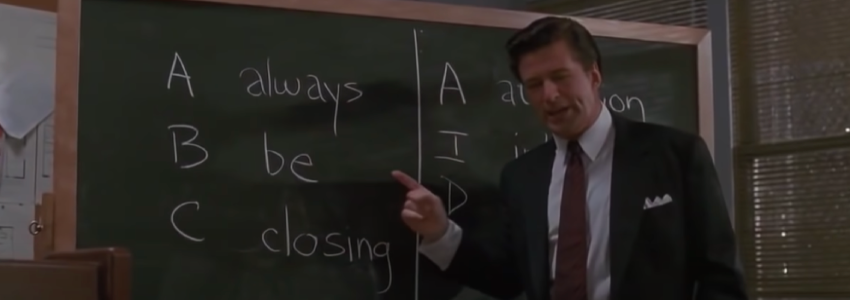“THE IDEA: I recently got off the phone with a small training agency that cold-called me three times, trying to sell me a consulting service. He called me uninvited, wouldn’t take “no” for an answer, and kept the heat on me until I was forced to hang up on him. Trust me, it takes a lot of negativities for me to hang up on anyone, especially a small business advisor. My love for smaller, family-run businesses is extensive; we are kindred spirits. Despite this, I ended up cutting the conversation short because it was exhausting.
The 1994 film Glenngary Glen Ross consists of a compelling acting ensemble including Jack Lemon, Al Pacino, Ed Harris, Alan Arkin, and Alec Baldwin as Blake, the sales trainer from downtown. If you’ve ever been in sales, the film will leave you on edge. It’s unsettling, nerve-wracking, and fraught with anxiety. The most compelling sales leaders are not bigger than life, overwhelming, or egocentric. They don’t look like Alec Baldwin’s iconic character from Glenngary Glen Ross. They’re not pushy. They’re not “Always Closing”.
Baldwin’s sinister character, from the second he walks into the room bellowing, “Put that coffee down, coffee is for closers,” leaves you off balance, uncomfortable, and reeling. You feel the dysfunction, sales pressure, and weight of his character. He’s the embodiment of the old school sales archetype: self-centered and reckless. Baldwin’s mantra, “Always Be Closing” resonates throughout the room. It is an heirloom and a remnant that haunts the industry even today.
After 15 years of coaching, research and facilitating discussions with many of top sales leaders in our industry, I want to challenge this stereotype. The most effective sales leaders are givers. They’re highly self-aware, creating a sense of psychological safety for those they serve. Unlike Baldwin’s character, they meet others where they’re at and constantly look to assist. They are considerate and assess the unspoken desires of their customers. The real value creators, or elite sales leaders, practice and protect a holistic mindset supported by three attributes:
- SELF-AWARENESS – They adjust to the communication preferences, personal needs, and relationship nuances of the people they serve. They practice adjusting to other’s interests and earning their trust.
- VULNERABILITY – They are extremely transparent and comfortable sharing the words, “I don’t know.” Relationships are something to be built over time, and solving problems are part of their job description. The very best sales leaders can’t wait for problems, because these are the moments they shine where others might prefer to hide.
- EMPATHY – The most skilled sales leaders don’t sell. They educate, co-create, and empathetically listen to the motives, fears, and unspoken interests of others. They introduce new ideas and are comfortable going deeper and staying in an assessment mode. They humbly ask “why” questions, trying to better understand hidden emotions and interests before moving to action.
I view the film Glengarry Glen Ross as a cautionary tale about fear, intimidation, and demotivation from a tyrannical business leader. Creating an atmosphere of Darwinian competition, especially within your own team, is a relic of the past. Unhealthy competition creates poor service providers, and pushy sales teams create unfit, untrustworthy partnerships. The very best sales leaders know that real relationships are not transactional, they are human, experiential, and vulnerable.
How do you show up with others and are you meeting others where they’re at?

